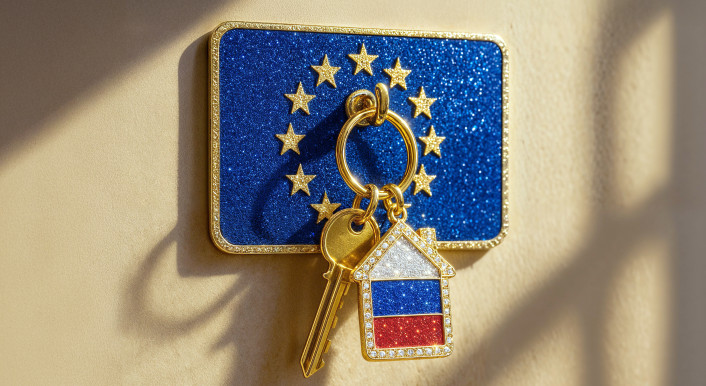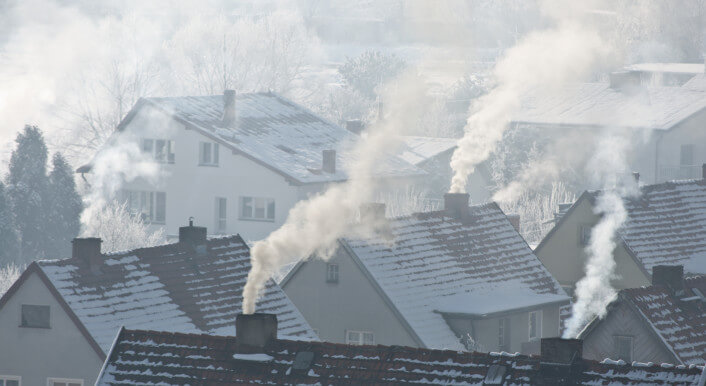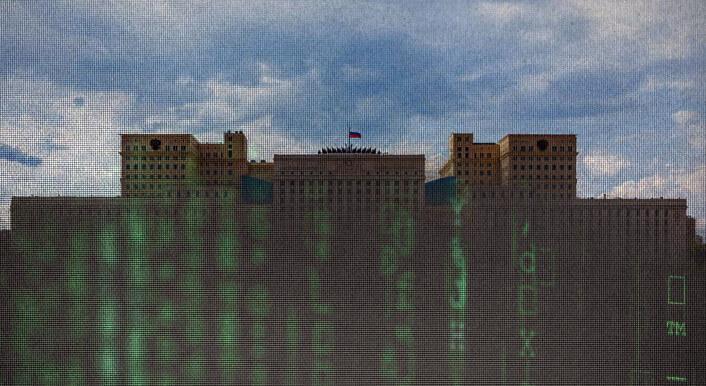How Much European Real Estate is Owned by Russians? The EU has no Idea
Despite sweeping sanctions, Russian nationals can still legally purchase property in the EU. Several member states view this as a major security risk. Our investigation reveals how an EU-wide ban collapsed due to the resistance of a single country.

At a glance
• Several countries, including Finland, Latvia and Lithuania, view this as a threat to national security.
• Our investigation reveals that a planned EU-wide ban was blocked by Cyprus.
• In Germany, there is no data on how many properties are owned by Russian nationals, or whether any are located near critical infrastructure.
The three apartment blocks making Estonia’s Ministry of the Interior nervous are located in the heart of Tallinn, with direct views of the NATO Cooperative Cyber Defence Centre of Excellence next door. The luxury flats were built by Tycoon UÖ, a company owned by Russian billionaire and property investor Vladimir Voronin. The remaining units are being advertised in Estonian, English, Finnish and Russian.
Although extensive sanctions have been imposed on Russia since February 2022, Russian nationals can still legally buy homes and apartments across the European Union. Several countries see this as a serious security threat, citing fears of espionage and attacks on critical infrastructure. Latvia’s security service, the VDD, confirmed in response to a query that inspections of Russian-owned property in Latvia have in certain cases already revealed risks to national security.
It did not have to come to this. As early as May 2022, the European Commission proposed a ban on property purchases by Russian nationals as part of a tough sanctions package in response to the invasion of Ukraine. A corresponding proposal appeared in the draft of the EU’s sixth sanctions package. But the ban failed to pass – despite support from several countries, including Poland and Germany, and the fact it included exemptions for dual nationals. Internal documents obtained by CORRECTIV now show that the proposal collapsed due to the opposition of a single member state: Cyprus. The island nation has long benefited from Russian capital.
The Russian invasion of Ukraine had been underway for ten weeks when the European Commission presented its draft of the sixth sanctions package on 3 May 2022. Alongside a sweeping import ban on Russian crude oil, the proposal included a provision to ban Russian firms and individuals from buying property in the EU.
What followed was the usual back-and-forth. Before a sanctions package can be adopted by the EU Council, the member states’ permanent representatives to the EU negotiate a version acceptable to all, in consultation with their national governments.
German diplomat criticizes watered-down sanctions plans
These negotiations happen behind closed doors, and the documents and correspondence are not public. But they reveal just how far apart the positions of individual member states can be.
On 5 May, Germany’s then permanent representative to the EU, Michael Clauß, reported back to Berlin that the oil embargo and its deadlines were, “as expected, the most controversial issue”, but that the property ban was also under discussion. Two days later, he reported that Cyprus had complained its proposals had been ignored. At the next meeting of EU ambassadors, Cyprus again raised questions about the ban.
By 29 May, the property ban had been quietly dropped. Clauß reported back to Berlin: “Other points raised in the discussion included strong criticism of the removal of the property acquisition ban (from myself, as well as POL, LTU, LVA)”, referring to Poland, Lithuania, and Latvia.
Cyprus had apparently demanded that the ban not apply to Russian nationals residing outside Russia. The Commission feared this would make the measure easy to circumvent simply by changing one’s registered address. That, officials argued, would be “difficult to justify to the public”. The Commission had wanted to maintain the ban but concluded that the exemptions demanded by Cyprus would “gut” the proposal – so it was scrapped altogether.
Clauß wrote that he had expressed “disappointment” that the revised version of the sixth sanctions package fell “well short of the original level of ambition”, adding that the removal of the property ban was “hardly comprehensible”.
The close ties between Cyprus and Russia
Why was Cyprus so determined to keep Russians in its property market? The country has traditionally had closer ties to Russia than most other EU member states, explains Philipp Lausberg of the European Policy Centre – culturally, through their shared Orthodox Christian heritage, and economically. Cyprus has often been dubbed “the Moscow of the Mediterranean.”
A complicated connection between political elites and corporate service providers in Cyprus has made its offshore industry attractive for Russian companies with close ties to the Kremlin, according to the Centre for the Study of Democracy in Sofia, Bulgaria. In 2023, an investigation by the International Consortium of Investigative Journalists revealed that even after the invasion of Ukraine, funds from sanctioned Russian oligarchs continued flowing into Cyprus, apparently to shield them from sanctions.
For years, Cyprus also drew foreign investment through its “golden passport” scheme: individuals investing at least €2 million were granted citizenship – an open door to the EU. The programme was shut down in 2020 following corruption allegations. A 2020 investigation by Al Jazeera found that passports had even been sold to convicted criminals. In May 2025, Cyprus’s Auditor General reported that political parties in the country had received over €1 million in donations linked to the scheme.
But even without golden passports, Russian money continues to pour into Cypriot real estate. Russians remained the top foreign buyers of property in Cyprus as of 2023, according to the then-director of the land registry. One key reason for the island nation’s appeal: there is no real estate tax. Statistics from Cyprus’ Ministry of the Interior show the most common nationalities of property buyers across all provinces in 2021 and 2024. Russians consistently rank in the top ten; in Limassol, they are second only to Cypriots.
Cyprus has recently made efforts to clean up its reputation. The latest report by MONEYVAL, the Council of Europe’s anti-money laundering body, acknowledged significant progress. And in July this year, Cyprus launched a new body to enforce sanctions.
Still, Cyprus is far from the only EU country where Russians have continued buying property after the invasion. In absolute numbers, France and Spain top the list, according to a real estate portal. But no official data exists at the EU level.
Germany has no data on Russian-owned real estate
What about Germany? Before talks began on the seventh sanctions package, the German Foreign Ministry was still calling for “urgent revisions” on the property issue. Not all Russian interests in Germany make headlines as they did in 2023, when a Russian investor attempted to acquire a stake in Frankfurt-Hahn Airport, a former military airfield with four-kilometre runways capable of accommodating Antonov An-224s – cargo aircraft that can also be used for military transport. The German government stepped in then, invoking the Foreign Trade and Payments Ordinance. When it comes to ordinary property purchases, however, there’s virtually no oversight.
According to political economist Philipp Lausberg, banning property purchases could reduce Russian influence and serve as a form of punishment. “The Russian elite is very used to luxury”, he says. “Taking away another of their toys could stir domestic discontent and increase pressure on Putin.”
But there’s another side to that coin: such a ban would also impact anti-regime Russians, as well as skilled professionals who have left Russia or plan to do so. “That would be a blow to the Russian economy, and the EU could amplify that by attracting more highly skilled Russian workers with better incentives”, says Lausberg. “But of course there’s always the security angle. Among these migrants, there will inevitably be some who are connected to intelligence services or seeking to undermine Europe in other ways.”
The EU has meanwhile passed its 18th sanctions package against Russia. A property ban was not included. Some countries are now taking matters into their own hands. Since mid-July, Finland has banned Russians and Belarusians from buying property unless they hold EU residency status. The move is intended to prevent properties being used “to plan hostile actions against Finnish society”. In Estonia, Russian nationals will be barred from buying property near strategically sensitive locations. Latvia introduced a general ban in July, stating it was necessary “to reduce the influence and presence of individuals and companies in Latvia that pose a threat to the country”. Lithuania has had such a ban in place since 2023.
In Germany, former Finance Minister Christian Lindner (FDP) announced plans in 2023 for a property transactions register to combat money laundering. However, the law could not be passed before the dissolution of the governing coalition in autumn 2024.
When queried, a spokesperson for the German Interior Ministry said there was no evidence that such property purchases by Russian nationals had served as the starting point for intelligence activities. However, she also confirmed a significant blind spot: there is still no reliable data in Germany on how many properties are owned by Russians – or whether any are located near critical infrastructure.
Editing: Justus von Daniels
Fact Check: Annika Joeres
Picture: Ivo Mayr
Communication: Esther Ecke



